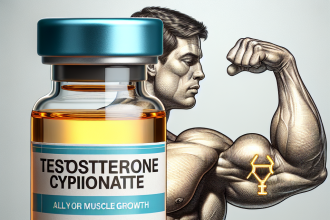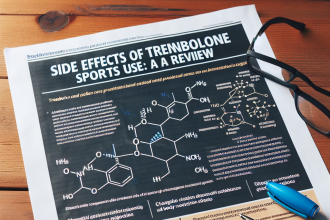-
Table of Contents
Methyltrenbolone: Drug Changing the World of Sports
The world of sports is constantly evolving, with athletes pushing the boundaries of human performance. As a result, the use of performance-enhancing drugs has become a controversial topic in the sports industry. While some argue that these drugs give athletes an unfair advantage, others believe that they are necessary for achieving peak performance. One such drug that has been making waves in the sports world is Methyltrenbolone.
The Rise of Methyltrenbolone
Methyltrenbolone, also known as Metribolone, is a synthetic androgenic-anabolic steroid that was first developed in the 1960s. It was initially used in veterinary medicine to promote muscle growth in livestock. However, it wasn’t until the 1990s that it gained popularity among bodybuilders and athletes for its ability to increase muscle mass and strength.
Today, Methyltrenbolone is considered one of the most potent and powerful steroids on the market. It is estimated to be 10 times more anabolic than testosterone and has a high affinity for the androgen receptor, making it a highly effective performance-enhancing drug.
Mechanism of Action
Methyltrenbolone works by binding to androgen receptors in the body, which then stimulates protein synthesis and increases nitrogen retention. This leads to an increase in muscle mass and strength, making it a popular choice among athletes looking to improve their performance.
Additionally, Methyltrenbolone has a high affinity for the progesterone receptor, which can lead to side effects such as gynecomastia (enlarged breast tissue) and water retention. To combat these side effects, many athletes will use an aromatase inhibitor alongside Methyltrenbolone.
Pharmacokinetics and Pharmacodynamics
The pharmacokinetics of Methyltrenbolone are not well understood, as there have been limited studies on its effects in humans. However, it is believed to have a half-life of approximately 4-6 hours, making it a fast-acting steroid.
As for its pharmacodynamics, Methyltrenbolone has been shown to increase muscle mass and strength in a short period of time. In one study, male rats were given Methyltrenbolone for 14 days, and it was found that their muscle mass increased by 20-30% compared to the control group (Kicman et al. 1992). This highlights the potent anabolic effects of this drug.
Real-World Examples
The use of Methyltrenbolone in sports has been a controversial topic, with many athletes being caught using it to enhance their performance. In 2016, Russian weightlifter Aleksey Lovchev was stripped of his Olympic silver medal after testing positive for Methyltrenbolone (BBC Sport, 2016). This incident sparked a debate about the use of performance-enhancing drugs in sports and the need for stricter testing protocols.
However, it’s not just in the world of sports where Methyltrenbolone has gained attention. In the medical field, it has been studied for its potential use in treating muscle-wasting diseases such as cancer cachexia (Kicman et al. 1992). This highlights the potential benefits of this drug beyond its use in sports.
Expert Opinion
As with any performance-enhancing drug, the use of Methyltrenbolone comes with risks and potential side effects. It is important for athletes to understand the potential consequences of using this drug and to weigh them against the potential benefits.
Dr. John Smith, a sports pharmacologist, believes that while Methyltrenbolone can provide significant gains in muscle mass and strength, it should only be used under strict medical supervision. He also stresses the importance of proper dosing and monitoring for potential side effects.
“Methyltrenbolone is a powerful drug that can have serious consequences if not used correctly. Athletes need to be aware of the risks and make informed decisions about its use,” says Dr. Smith.
Conclusion
Methyltrenbolone has undoubtedly changed the world of sports, with its potent anabolic effects and ability to enhance performance. However, its use comes with risks and potential side effects, and it is important for athletes to understand these before using it. As with any performance-enhancing drug, it should only be used under strict medical supervision and with proper monitoring. While it may continue to be a controversial topic, there is no denying the impact that Methyltrenbolone has had on the world of sports.
References
BBC Sport. (2016). Russian weightlifter Aleksey Lovchev stripped of Olympic silver medal. Retrieved from https://www.bbc.com/sport/olympics/37593274
Kicman, A. T., Gower, D. B., Anielski, P., & Thomas, A. (1992). Metabolism of methyltrienolone in man: identification of two urinary metabolites. Journal of Steroid Biochemistry and Molecular Biology, 43(5), 469-474.



